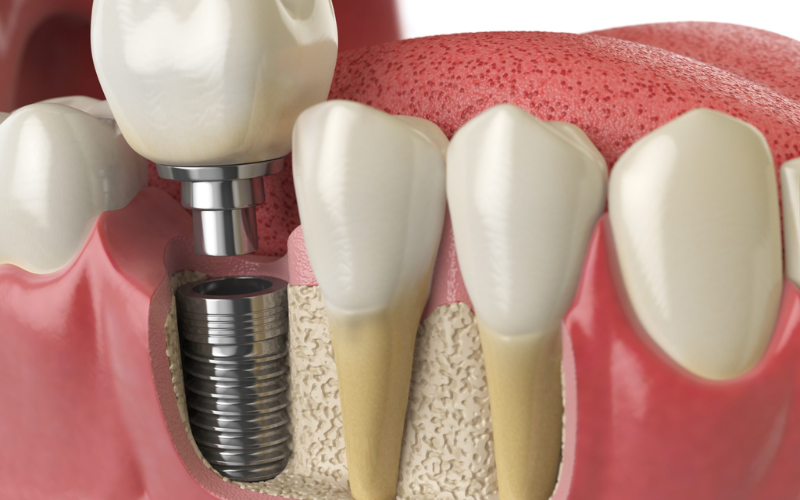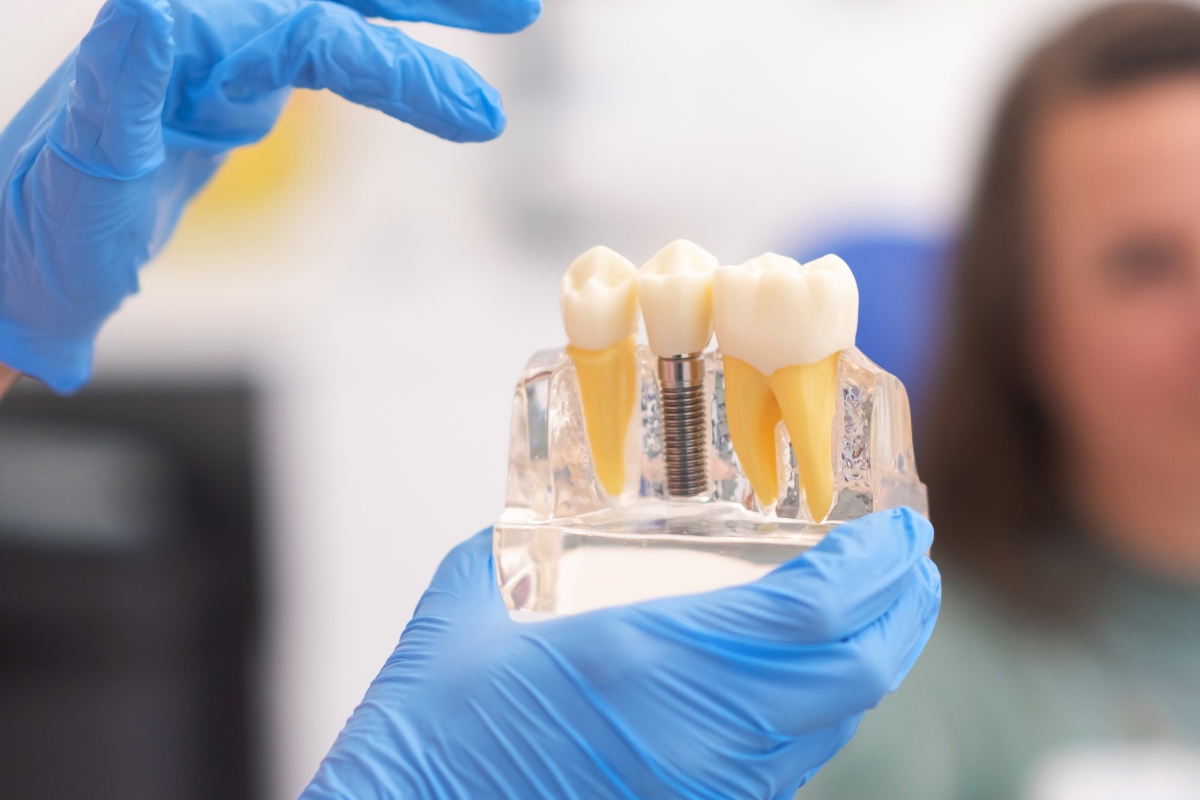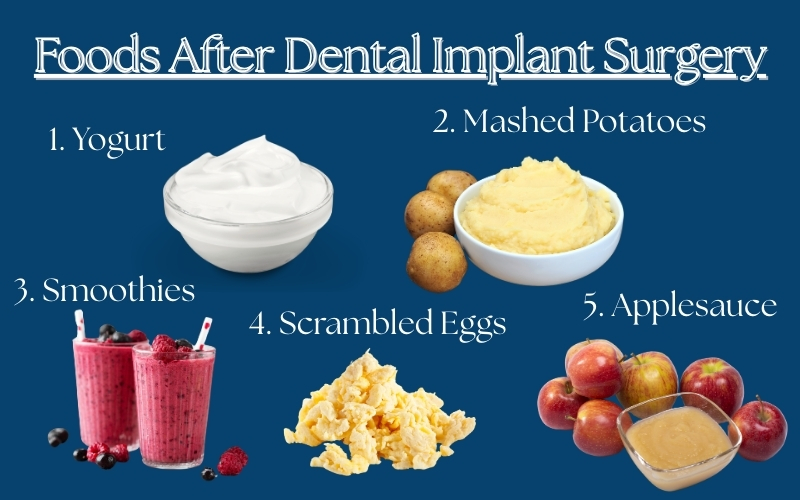
Dental implants offer a natural-looking, durable, and long-lasting alternative to traditional dentures or bridges. However, like any dental restoration, dental implants can sometimes experience issues, including becoming loose or damaged. You should act immediately if you figure out any signs that your dental implant is loose or damaged.
Dentists can help you avoid further oral complications. In this blog, we’ll discuss what causes a loose or damaged dental implant to become loose or damaged, what to do if it happens, and how to prevent future issues.
Common Causes of Loose or Damaged Dental Implants
Before addressing what to do if your dental implant in Austin becomes loose or damaged, it’s essential to understand the potential causes. Dental implants are highly durable, but they can still experience problems due to the following reasons:
- Poor Osseointegration
Osseointegration is the process by which the dental implant fuses with the jawbone. Improper integration is a leading cause of dental implant failure. This can occur due to inadequate bone density, infection, or mechanical issues during implant placement.
- Infection (Peri-implantitis)
An infection around the implant can cause the surrounding tissues and bone to deteriorate, causing the implant loss. Peri-implantitis is similar to gum disease but affects the area around implants.
- Implant Overload
If the implant is subjected to excessive pressure, such as teeth grinding (bruxism), chewing on complex objects, or trauma, the implant may become loose. This overload can affect the healing process or disrupt osseointegration.
- Implant Failure or Fracture
Though rare, the implant itself can fail or fracture over time due to manufacturing defects, material wear, or trauma to the mouth. This can cause damage to the implant and surrounding structures.
- Problems with the Abutment or Crown
Sometimes, the issue may not be with the implant itself but with the abutment (the connector between the implant and the crown) or the crown. These parts can become loose or fractured, making it appear as though the implant is loose.
Necessary Actions in Case Dental Implant Becomes Loose or Damaged
If you notice that your dental implant has become loose or damaged, taking action as soon as possible is essential to prevent further complications. Here’s what you should do:
Please Don’t Panic, But Take It Seriously
While the feeling that your implant is loose is concerning, staying calm is essential. A loose or damaged implant may not always result in immediate pain or discomfort, but it can lead to long-term problems if not addressed. Seek assistance as soon as possible, as it offers better chances of saving the implant and preventing further damage.
Avoid Putting Pressure on the Implant
If your implant feels loose or damaged, avoid chewing on that side of your mouth to prevent further stress or damage. Eating soft foods and being gentle when brushing and flossing around the area will help minimize discomfort and reduce the risk of aggravating the problem.
Contact Dentist Immediately
If you notice any issues with your implant, contact our dentist as soon as possible. They will assess the situation to determine the cause of the looseness or damage. Dentists can usually save the implants with adjustments or a replacement crown. In other cases, the entire implant might require replacement.
Follow Dentist’s Instructions
Once our dentist examines the implant, they will recommend the appropriate course of action based on the severity of the issue. This may include:
- Repairing or Replacing the Crown or Abutment: If the issue is with the crown or abutment, our dentist may replace or tighten these components.
- Bone Grafting: If the implant has loosened due to bone loss or inadequate osseointegration, bone grafting may be required to help restore the foundation for the implant.
- Replacing the Implant: Dentists generally suggest replacing dental implants in case of significant damage.
Follow Post-Treatment Instructions for Healing
After the dentist addresses the issue, strictly following the dentist’s guidelines is crucial. You will be asked to avoid hard foods, and it is suggested that you use a special mouthguard to protect the implant. Adhering to dental guidelines will help you heal quickly and prevent future complications.
Preventing Future Implant Issues
While dental implants are incredibly durable, the following steps will help to reduce the risk of future loosening or damage:
- Practice Good Oral Hygiene
Maintain a good oral hygiene Keeping your implants and surrounding gums clean is essential for preventing infection and gum disease, which can lead to implant failure. Brush your teeth twice daily with a soft-bristled toothbrush, and use floss or interdental brushes to clean between the implant and gums.
- Avoid Hard Foods
To avoid placing excessive pressure on your dental implants, avoid biting down on tough foods like ice, hard candies, or unpopped popcorn kernels. These can damage the implant or cause the crown to become dislodged.
- Wear a Nightguard if You Grind Your Teeth
If you grind your teeth at night, a dentist may recommend a custom night guard to protect your implants and natural teeth from the damaging effects of bruxism.
- Attend Regular Dental Checkups
Regular dental checkups and cleanings are essential for monitoring the health of your implants. During these visits, the dentist will check for signs of infection or other problems, allowing them to address any issues early.
- Address Underlying Health Conditions
Conditions like diabetes, smoking, or poor bone density can increase the risk of implant failure. Managing these underlying health issues with your healthcare provider’s help can improve your dental implants’ success rate.
While dental implants are a durable and long-lasting solution, issues such as loosening or damage can still occur. Promptly addressing these issues by avoiding pressure on the implant, contacting your dentist, and following their instructions can help protect your investment and ensure the longevity of your dental implants.
Additionally, maintaining good oral hygiene, avoiding hard foods, wearing a nightguard, and attending regular checkups can prevent future problems. By taking these steps, you can maintain a healthy and functional smile for years.



